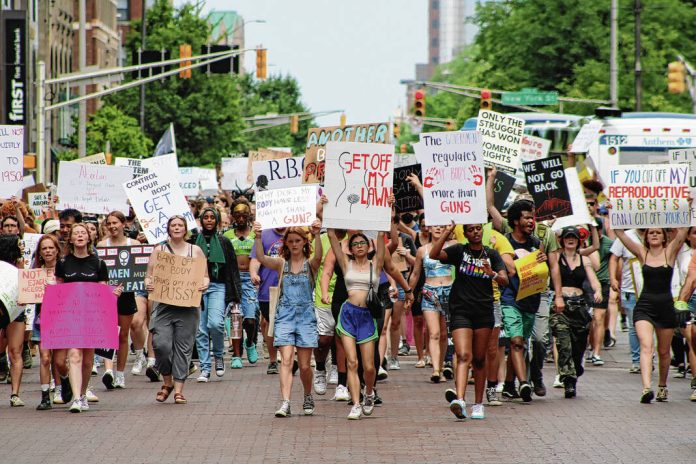Indiana abortion providers on Thursday filed an amended complaint challenging the state’s near-total abortion ban and seeking new injunctions against health and hospital clauses they argue are overly narrow or unnecessary.
The American Civil Liberties Union of Indiana filed the amendment on behalf of Indiana’s Planned Parenthood, Women’s Med Group, All-Options Pregnancy Resource Center and obstetrician-gynecologist Dr. Amy Caldwell.
“The fight isn’t over in Indiana,” the groups said in a joint statement. “… We are hopeful that the court will grant our request, ensuring that Hoosiers in the most vulnerable circumstances can still access care in their state.”
The plaintiffs’ first attempt — which alleged the ban would infringe on a constitutional right to privacy and violate guarantees of equal privileges and immunities — kept enforcement on hold for about a year.
The Indiana Supreme Court in late June upheld the ban, but said Hoosiers could still sue over specific parts of the ban or concrete examples of its consequences.
On Thursday, the plaintiffs took them up on it.
Health effects
The Supreme Court ruled that the state constitution protects a woman’s right to an abortion to prevent death, or to avoid a “serious health risk.” But the ban itself is more stringent.
It stipulates a “serious risk of substantial and irreversible physical impairment of a major bodily function” and specifically writes out psychological conditions alongside threats of self-harm and suicide.
The plaintiffs called that exception “unconstitutionally narrow.”
They asserted that people with “debilitating” conditions — or conditions that could become life-threatening over the course of pregnancy — could be “forced to remain pregnant and to suffer serious and potentially life-long harms to their health.”
Additionally, plaintiffs argued, the law could exclude patients with conditions requiring treatment that would harm a fetus — like many psychiatric medications.
And the mental health write-out will harm pregnant Hoosiers, they allege. “Mental health conditions are medical conditions that are rooted in biochemistry and physiology and can pose serious health risks to pregnant patients.”
While the organizations also sued on behalf of their staff, physicians and patients, they cited no specific patient stories with negative outcomes.
Hospital requirement ‘unnecessary’
The ban also stripped abortion clinics of their licenses, instead mandating that the procedures occur at hospitals or related ambulatory surgical centers.
The clinics have historically performed nearly all abortions in Indiana, with small numbers of hospitals contributing minute shares of the total.
The hospital requirement makes abortion inaccessible to even those Hoosiers who qualify for the procedure, the plaintiffs argued.
They alleged that:
“On information and belief,” no hospitals outside the city of Indianapolis are providing abortions under the ban’s exemptions — limiting access to those further afield;
Hospitals don’t advertise their abortion services and often don’t have obvious contact information available to prospective patients;
Hospital abortions will cost patients significantly more money than procedures performed at clinics;
And there’s “no medical reason” to bar clinics from providing historically safe abortions.
The plaintiffs asked the court for three preliminary injunctions.
Two would halt enforcement of the health risk language — for a broad range of physical health conditions and for mental health conditions — and one would pause the hospital requirement.
They also requested that the court eventually find both elements of the ban unconstitutional.
But the groups indicated that they’re not stopping there.
“While this would be a critical step forward for reproductive freedom, it would not restore access for most people seeking abortion in Indiana,” they said in the joint statement. “We will continue working to support Hoosiers in getting abortions — and we will continue to fight until access is fully restored.”
By Leslie Bonilla Muñiz – The Indiana Capital Chronicle is an independent, not-for-profit news organization that covers state government, policy and elections.





